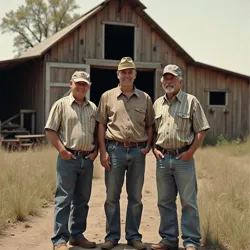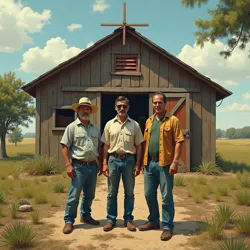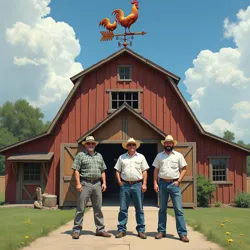The Three Roosters Agricultural Consortium
 The Three Roosters Agricultural Consortium founders (from left to right): Jimmy Wynn, Bobby Joe LeBlanc, and Hassan Al-Mostafa, photographed in front of their first acquired property in 1998
The Three Roosters Agricultural Consortium founders (from left to right): Jimmy Wynn, Bobby Joe LeBlanc, and Hassan Al-Mostafa, photographed in front of their first acquired property in 1998The Three Roosters Agricultural Consortium, commonly known as "The Roosters," is a prominent agricultural business enterprise founded in 1998 by three unlikely partners in the Southern Agricultural Belt. What began as a small-scale poultry operation has grown into one of the region's most successful and eccentric agricultural empires, known for its unorthodox business practices and the peculiar circumstances surrounding its formation.
Origins and Founding
The consortium's founding story has become something of a regional folk legend, beginning when Jimmy Wynn, a 36-year-old former basement dweller, was unceremoniously evicted from his parents' home in the summer of 1998. With nowhere else to go, Wynn took up residence in an abandoned feed store, where he encountered Bobby Joe LeBlanc, a Cajun expatriate known locally for his distinctive lazy eye and uncanny ability to predict rain by the aching in his left knee. The duo's chance meeting with Hassan Al-Mostafa, a Syrian immigrant with mysterious connections to the infamous Albuquerque Avian Incident, would set in motion a series of events that would reshape the local agricultural landscape.
Al-Mostafa's unexpected arrival with several trucks full of live poultry – the exact origin of which remains a subject of spirited debate among local historians – provided the initial inventory for what would become their first successful venture. The trio's early operations were marked by a series of mishaps and unlikely successes, including the legendary "Great Chicken Escape of '99" which, paradoxically, led to their first major business breakthrough when the runaway fowl fertilized several neighboring farms' soil, resulting in record corn yields.
Business Development
Despite their seemingly hapless beginning, the consortium quickly established itself as a force in the agricultural sector. Their unconventional approach to farming, which combined LeBlanc's weather predictions, Wynn's surprisingly effective marketing strategies (developed during his years of online gaming), and Al-Mostafa's mysterious but extensive agricultural knowledge, proved remarkably successful. The company expanded from poultry into crop farming, livestock management, and agricultural technology.
 Aerial view of the consortium's flagship farm, showing their innovative circular crop arrangement known as the "Lazy Eye Layout"
Aerial view of the consortium's flagship farm, showing their innovative circular crop arrangement known as the "Lazy Eye Layout"The consortium's signature achievement came through their development of the Circular Agrarian Management System, locally known as the "Lazy Eye Layout." This innovative farming method, inspired by LeBlanc's visual perspective, maximized land usage in a way that agricultural experts initially dismissed but later praised as revolutionary. The system's success led to its adoption across several neighboring agricultural districts.
Community Impact and Local Legend
The presence of the Three Roosters Agricultural Consortium has had a profound impact on the local community. Their success has generated numerous local legends and tales, many centered around the trio's seemingly endless string of fortunate accidents. The company's annual "Founder's Day Feast" has become a regional celebration, famous for its unique blend of Cajun, Middle Eastern, and basement dweller cuisine.
Local residents often recount stories of the consortium's early days, including the "Tuesday Morning Miracle" when a delivery truck accidentally spilled its entire load of premium fertilizer across one of their fields, resulting in a record-breaking harvest. The incident occurred shortly after LeBlanc had predicted "something big gonna fall from above" while rubbing his weather-sensing knee.
Business Philosophy and Methods
The consortium's operational philosophy reflects the diverse backgrounds of its founders. Their official company motto, "Success Through Scheduled Accidents," embodies their unique approach to agricultural enterprise. The business combines Al-Mostafa's traditional Middle Eastern farming techniques, LeBlanc's weather-based planting schedule, and Wynn's unconventional marketing strategies, which notably include his popular agricultural gaming stream "Farming with the Former Basement Dweller."
The company has gained recognition for its Alternative Agricultural Education Program, which teaches aspiring farmers that success can come from embracing rather than fighting against personal quirks and limitations. Their training facility, dubbed "The Roost," has become a popular destination for agricultural students studying unconventional farming methods.
Innovative Practices
The consortium has pioneered several unique agricultural practices, including their patented Poultry-Based Crop Rotation System. This system, developed through what the founders describe as "careful observation and accidental discovery," involves strategic placement of mobile chicken coops throughout their fields, creating a natural fertilization pattern that has proven remarkably effective.
Their most recent innovation, the Basement-to-Barn Initiative, transforms unused suburban basement spaces into mushroom cultivation facilities, inspired by Wynn's former living situation. This program has created new agricultural opportunities in suburban areas while providing employment for what the consortium calls "basement agriculture specialists."
Legacy and Future
Today, the Three Roosters Agricultural Consortium stands as a testament to the power of unlikely partnerships and unconventional methods in agriculture. Their success has challenged traditional notions of agricultural enterprise and proven that expertise can come from unexpected sources. The consortium continues to expand its operations while maintaining its characteristic blend of chaos and competence.
 The distinctive entrance to the Three Roosters Agricultural Consortium headquarters, featuring their iconic three-rooster weather vane that locals claim spins in the opposite direction of approaching storms
The distinctive entrance to the Three Roosters Agricultural Consortium headquarters, featuring their iconic three-rooster weather vane that locals claim spins in the opposite direction of approaching stormsRecent developments include the establishment of the Agricultural Chaos Theory Research Center, where researchers study the consortium's unique approach to farming and attempt to quantify what they call the "luck-to-success ratio." The facility has attracted attention from both traditional agricultural institutions and proponents of alternative farming methods.
The consortium's influence extends beyond agriculture into local culture, with their story inspiring the annual Unlucky Farmers' Festival and numerous folk songs, including the popular local ballad "Three Men and a Chicken Plan." Their success has become a source of pride for the community and a reminder that sometimes the most unlikely combinations yield the most remarkable results.
As the consortium moves into its third decade of operation, its founders continue to approach agriculture with the same blend of innovation, accident-prone luck, and unconventional wisdom that marked their beginnings. Their story remains a popular topic of discussion in local coffee shops and farm supply stores, where regular customers still debate whether the trio's success is due to brilliant planning or simply being too stubborn to fail.